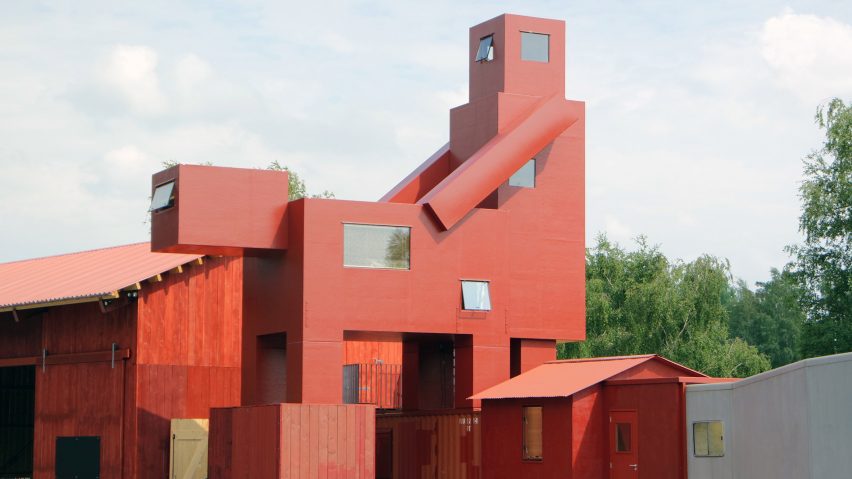Artist Joep van Lieshout has slammed a last-minute decision made by the Musée du Louvre to cancel a display of his controversial Domestikator sculpture, which looks like a man penetrating a four-legged animal.
The Atelier van Lieshout founder said the museum was "totally crazy" to scrap plans to install the provocative sculpture in Paris' Jardin des Tuileries, and claims that it was due to worries about offending visitors.
"In a very short-sighted way they thought it was explicit or sexual and then they cancelled it," he told Dezeen.
"I think that's a very sad development. I think art should be a place where there are very few limits."
Van Lieshout's Rotterdam-based studio first unveiled the 12-metre high sculpture in 2015, as part of an art village he created in Germany. Designed as a hybrid between art and architecture, it is intended to represent human domestication, and domination of the natural environment.
Although it looks an expression of bestiality, Van Lieshout insists that the piece is not primarily or explicitly sexual in nature.
He says his aim was to raise questions about what taboos remain, in a world where the introduction of genetic manipulation, robotics and artificial intelligence has pushed ethical boundaries to the extreme.
"This piece is not about sex, it's about the ethics of technological innovation," said Van Lieshout.
"It's not at all explicit. It's not scandalous," he added. "It actually invites people to think about a very important subject: what do we do with out technological advancement? What do with big data, with artificial intelligence, with robots?"
Louvre president admits concerns about sculpture
The Louvre was planning to exhibit the sculpture in the Jardin des Tuileries, where every year it presents sculptures from leading artists and architects, as part of the International Contemporary Art Fair (FIAC).
The sculpture was set to go on show from October 16 but, the Louvre cancelled the display at the last minute.
In a statement to Dezeen, the museum claimed it was a mutual decision between the museum and three committees. It suggested that it was dropped because there were already more sculptures planned than previous years.
"The work Domestikator was presented after these commissions, not allowing to discuss their presentation in the garden collegially," reads the statement.
"The number of contemporary works presented in the Tuileries during the 2017 FIAC is particularly important: around 30, while some 20 were usually offered to the view of the many walkers and visitors of the garden."
But, according to French newspaper Le Monde, Louvre president Jean-Luc Martinez has admitted that there were concerns that the would be "misunderstood" by their audience, following internet commentary describing the work as "too brutal".
There were also worries about the sculpture's planned location, close to a children's playground.
Cancellation suggested censorship in the art world
Van Lieshout is convinced that the decision was made solely to prevent causing controversy. He said he was afraid that the decision is symptomatic of a wider censorship in the art world.
"I think museums, and everyone actually, are extremely afraid of what public could say," he said,
"You censor yourself and you censor your work, or anything that touches ethical or political or sexual matters will be boycotted."
Van Lieshout believes that the Louvre wanted to avoid bad press from conservative religious groups or animal rights advocates, who could potentially misunderstand the message of the piece.
"Fundamentally they are spineless figures that want to avoid any risk," he said. "I feel that museums are directed by a team of lawyers and marketing people, instead of people with a passion for art."
He insists that the piece is worthy, and that it no more explicit than many pieces in the Louvre's collection.
"In the Louvre there are paintings and sculptures where there are nude women, rape and bestiality, that are much more explicit than my piece," he said.
"I wish I could make it so explicit!" he added. "But it was too expensive, I could only make the minimal version of it."
Design gallery sides with artist
Carpenters Workshop Gallery in Paris has defended Van Lieshout, and also claims it was vetoed by the museum for fear of offending visitors.
"Carpenters Workshop Gallery stands in solidarity with its artist Atelier van Lishout and FIAC, in face of the refusal of the Domestikator installation on the request of the board of directors at the Louvre Museum, in fear that the work would risk, 'being badly received by the typical visitors to the Garden des Tuileries'," said gallery founders Julien Lombrail and Loïc Le Gaillard.
The gallery thanked Paris City Hall for its efforts to find another location to display the work, but said it was too late to find a new venue.
Domestikator has been on display for three years as part of The Good, The Bad and The Ugly – a giant art village at the Ruhrtriennale arts festival in west Germany.
According to Van Lieshout, there have been no complaints from the public in that time, and the installation was even used as a venue by a youth theatre putting on a production.

